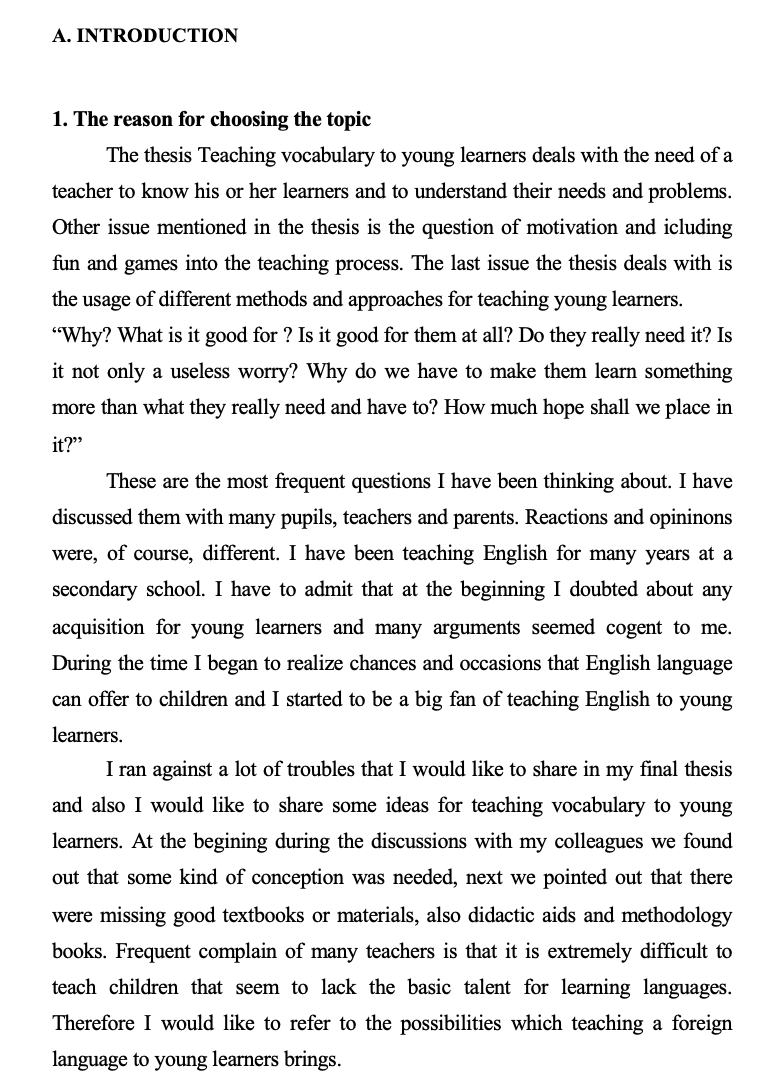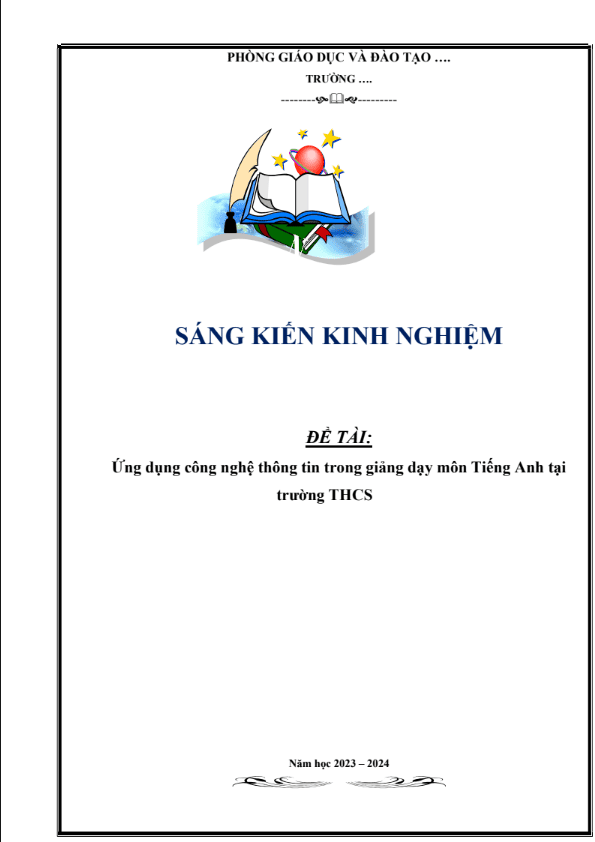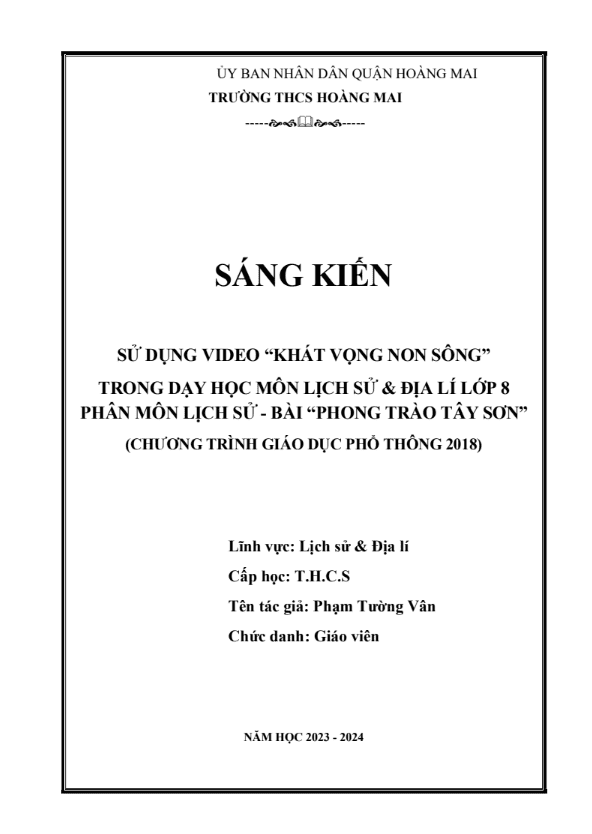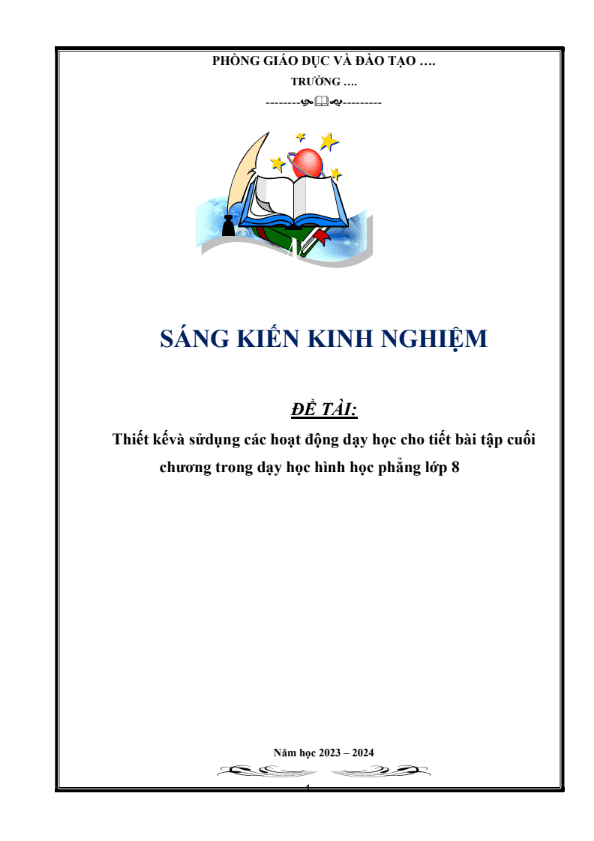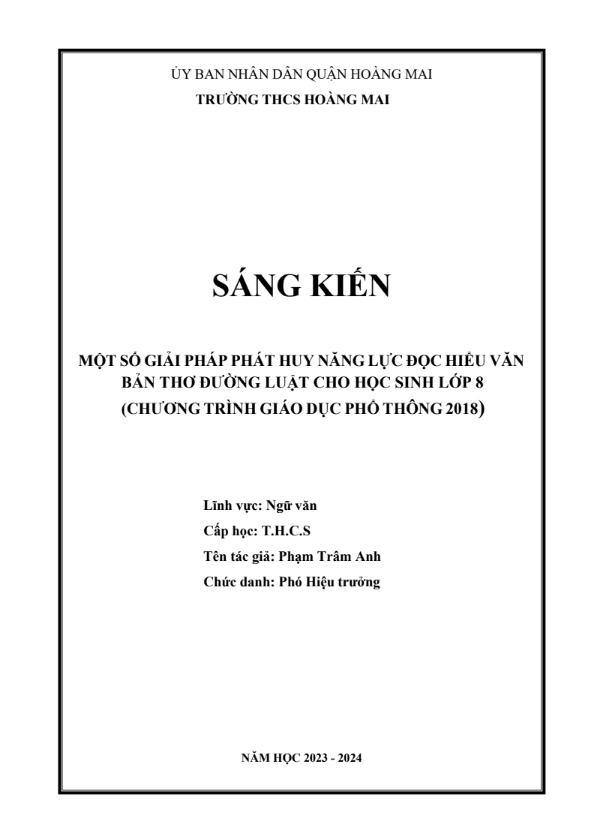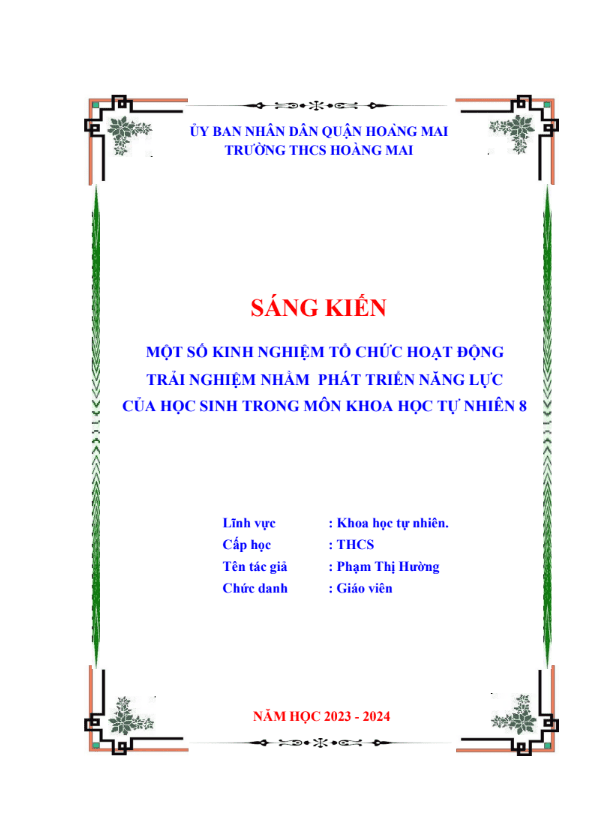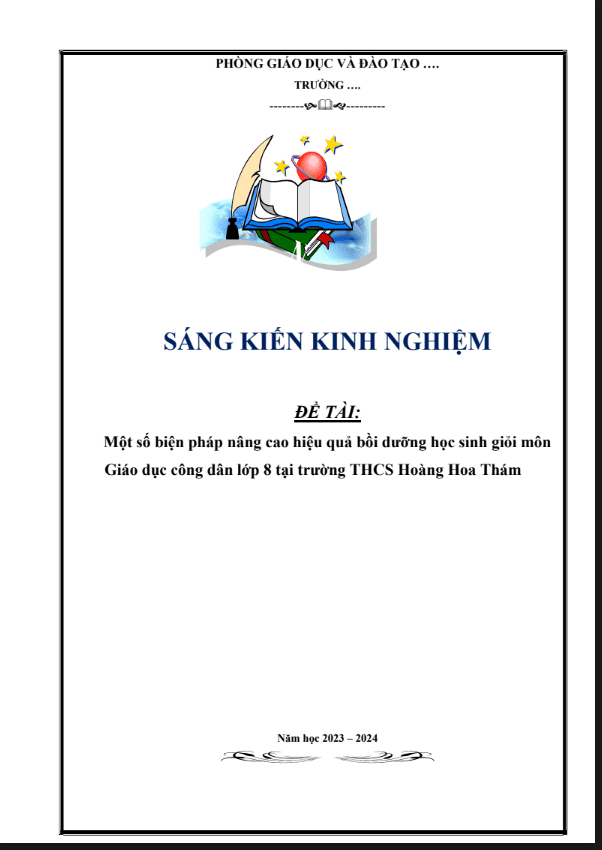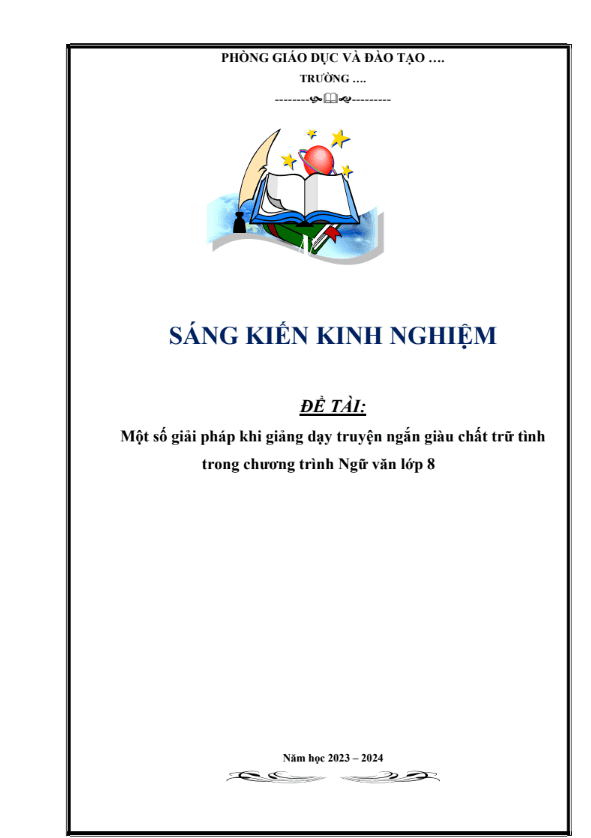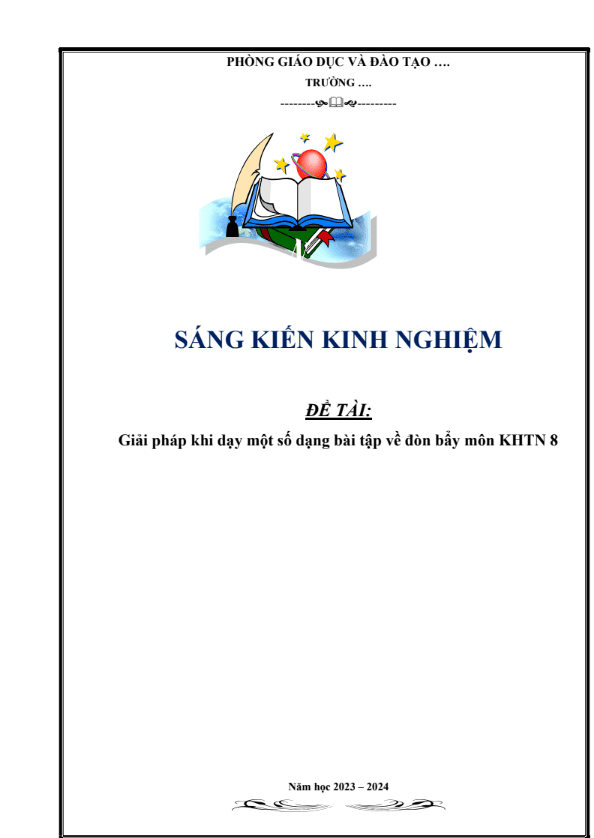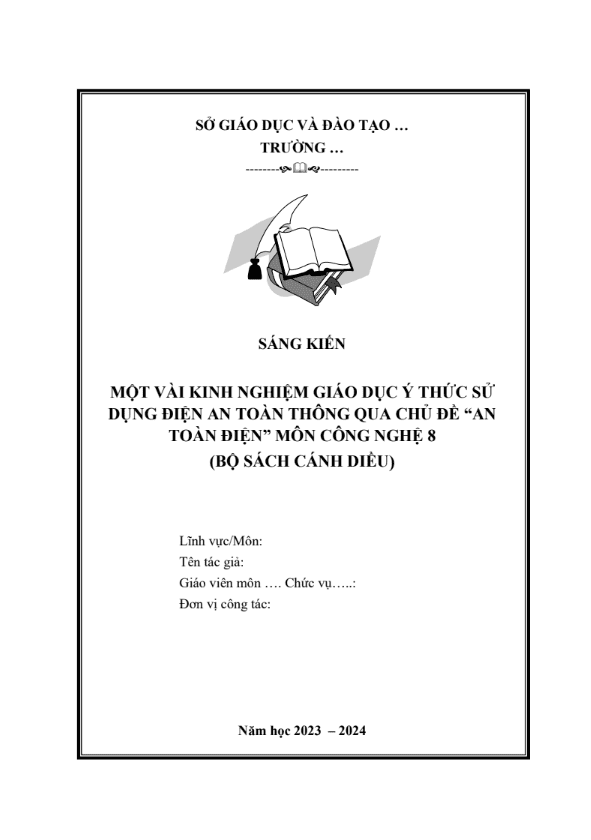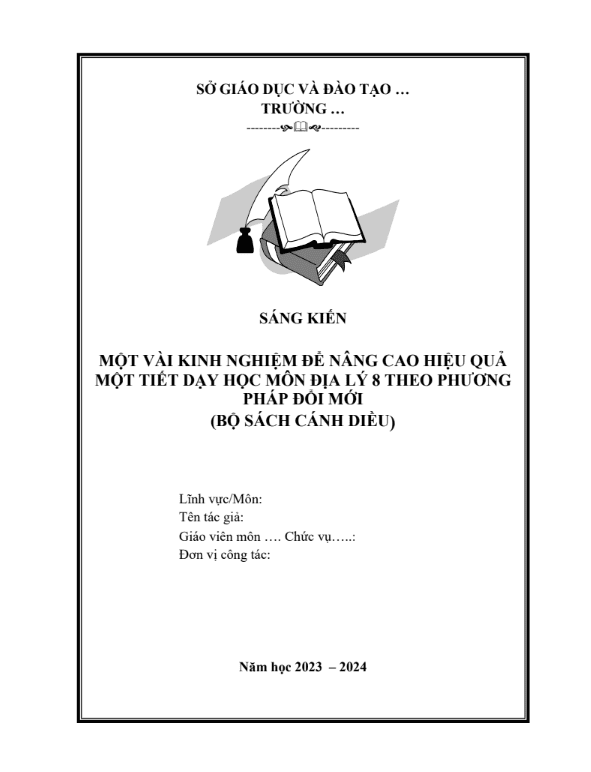SKKN Experience in teaching vocabulay for the students of grade 6
- Mã tài liệu: BM6117 Copy
| Môn: | Tiếng anh |
| Lớp: | 6 |
| Bộ sách: | |
| Lượt xem: | 996 |
| Lượt tải: | 7 |
| Số trang: | 28 |
| Tác giả: | Lê Thị Thu Trang |
| Trình độ chuyên môn: | Thạc sĩ giáo dục |
| Đơn vị công tác: | Trường THCS Hai Bà Trưng |
| Năm viết: | 2019-2020 |
| Số trang: | 28 |
| Tác giả: | Lê Thị Thu Trang |
| Trình độ chuyên môn: | Thạc sĩ giáo dục |
| Đơn vị công tác: | Trường THCS Hai Bà Trưng |
| Năm viết: | 2019-2020 |
Sáng kiến kinh nghiệm “SKKN Experience in teaching vocabulay for the students of grade 6” triển khai gồm các biện pháp nổi bật sau:
3.1. Vocabulary presentation
3.2. Be realistic
3.2.1. Choosing activities
3.2.2. The role of fun and games in the lessons
3.3. Practical part
33.3.1. Lesson plan 1
3.3.2. Lesson plan 2
3.3.3. Lesson plan 3
3.3.4. Lesson plan 4
Mô tả sản phẩm
- INTRODUCTION
- The reason for choosing the topic
The thesis Teaching vocabulary to young learners deals with the need of a teacher to know his or her learners and to understand their needs and problems. Other issue mentioned in the thesis is the question of motivation and icluding fun and games into the teaching process. The last issue the thesis deals with is the usage of different methods and approaches for teaching young learners.
“Why? What is it good for ? Is it good for them at all? Do they really need it? Is it not only a useless worry? Why do we have to make them learn something more than what they really need and have to? How much hope shall we place in it?”
These are the most frequent questions I have been thinking about. I have discussed them with many pupils, teachers and parents. Reactions and opininons were, of course, different. I have been teaching English for many years at a secondary school. I have to admit that at the beginning I doubted about any acquisition for young learners and many arguments seemed cogent to me. During the time I began to realize chances and occasions that English language can offer to children and I started to be a big fan of teaching English to young learners.
I ran against a lot of troubles that I would like to share in my final thesis and also I would like to share some ideas for teaching vocabulary to young learners. At the begining during the discussions with my colleagues we found out that some kind of conception was needed, next we pointed out that there were missing good textbooks or materials, also didactic aids and methodology books. Frequent complain of many teachers is that it is extremely difficult to teach children that seem to lack the basic talent for learning languages. Therefore I would like to refer to the possibilities which teaching a foreign language to young learners brings.
The aim of this work is to show several ways that can be used for teaching vocabulary to young learners. I would like to show why and how teaching vocabulary to young learners can be more efficient.
I divided my thesis into the theoretical and the practical part – the practical part follows the theoretical part. In the theoretical part I will introduce the aim of this thesis, then I will try to describe who is a young learner. In the next chapter I will focus on what is vocabulary and how it is learned and also the ways how vocabulary can be presented..
In the second part of my thesis I would like to present my system of work and also different methods I use while teaching. I will enclose some materials and games that I use in 6 my lesssons. In conclusion I will briefly summarize my thesis. After that follows the list of sources – books (used literature) which I used for my thesis and the appendices where I included some materials and exercises with the keys.
After exploring and accumulating the experiences from colleagues, I have some experiences in teaching reading comprehension and achieved quite effective results. The students are more interested in learning English and more confident in doing their reading exercises. This improves that my methods are right. With the passion and the love for teaching English, I have studied and developed the research: “Experience in teaching vocabulay for the students of grade 6 at Dong Hai secondary school. ”
- The purpose of the research.
– The research applies the methods of teaching vocabulary to involve students in learning English well.
– Creating the language circumstance to communicate in English and promote students to actively participate in communicative activities; offering some solutions and methods for teaching vocabulary.
– Exchanging and sharing some experiences in teaching vocabulay for secondary students.
- The object and subject of the study.
– The object of the study: Students of grade 6 at Dong Hai Secondary school, Thanh Hoa City.
– The subject of the study: Experience in teaching vocabulay for the students of grade 6 at Dong Hai secondary.
- Research methods.
– Method of observation: The implemention of self-explortion theme study, conduccted attend classes of colleagues.
– Experimental Methods: Teachers conducted experiments teach each specific purpose required some form applicable lessons.
– Exchange Methos, discussion: After the hours of colleagues, colleagues who take time to implement the project, co-workers and the people who implement the project, conduct exchanges and discussions to draw from that experience for lesson.
– Investigation Method: Teachers ask question to check understanding the content assessment of student lessons.
This is the result table in September in the school year ………..before applying the method.
| Class | Total | Excellent
(A) |
Good
(B) |
Fair
(C) |
Poor
(D) |
Fail
(F) |
| 6A | 40
100% |
3
7,5 % |
8
20% |
14
35% |
10
25% |
5
12,5% |
| 6B | 38
100% |
2
5,3% |
5
13,2% |
14
36,8% |
10
26,3% |
7
18,4% |
- CONTENT
1 . Theoretical basis of the initiative experience.
1.1. Young learner – who is a young learner?
A young learner – who is he or she? This term covers a wide age range, this can be anybody from the age of three to the age of eighteen. There is a big difference between what a –three-year-old child can do and what a child of fifteen can do. We should consider their development too. Some children develop faster, others need more time. Teaching young learners requires the knowledge of knowing all the development differences. Understanding these differences can help me as a teacher to develop methods and a system of work that I will use in the process of teaching. Of course, it is not possible to say that every child of six will know this and that. But it is possible to pick out some chracteristics which I as a teacher should know and should be aware of.
It is generally known that the Czech system officially allows children to start learning a foreign language in the 6th grade. In the Czech Republic children have started learning a foreign language in the 6th grade so far. However, according to the new school curricula, which is starting to be adopted from September 2006, the children will start a year earlier and in some schools the foreign language will be introduced from the 1st grade. In the 7th grade they will have to start learning a second foreign language. In my opinion, the sooner they start, the better for them. Their brain and memory is ready for learning and most of them can learn quite well. There have been many disputes and discussions over this. I think these debates will be run over and over because nobody is able to say the exact time for beginning to learn foreign languages. From my personal experience, I achieved quite good results with kindergarten children so I do not see any problems for older learners. I think if very young learners are able to achieve good results, I think the older ones can do it too.
TÀI LIỆU LIÊN QUAN
- 0
- 114
- 1
- [product_views]
- 2
- 163
- 2
- [product_views]
- 3
- 183
- 3
- [product_views]
- 0
- 124
- 4
- [product_views]
- 0
- 134
- 5
- [product_views]
- 0
- 109
- 6
- [product_views]
- 5
- 101
- 7
- [product_views]
- 7
- 117
- 8
- [product_views]
- 1
- 174
- 9
- [product_views]
- 8
- 179
- 10
- [product_views]

